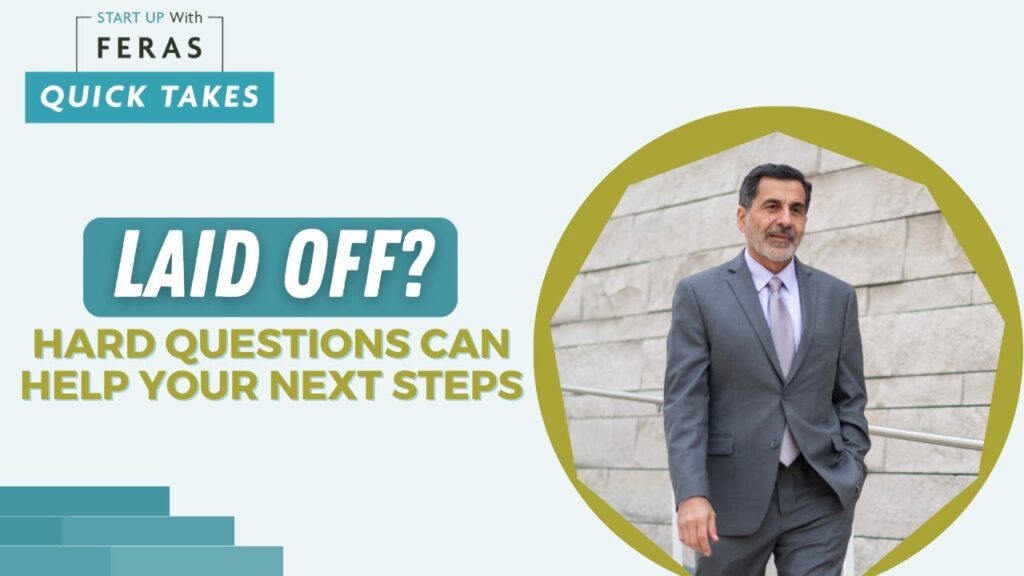What to Do After Getting Laid Off – Start Your Own Business!

“The quality of your life is in direct proportion to the amount of uncertainty you can comfortably deal with.”
– Tony Robbins, Master Coach, Speaker, and Bestselling Author
Wondering what to do after getting laid off and are thinking of starting a business instead of looking for a new job? This might be the most opportune time to do so.
The recent rounds of layoffs rocking the tech sector, extending into journalism outlets and retail, might not reach the magnitude of the early-2023 layoffs (knock on wood), but the personal toll is significant for every individual finding themselves unexpectedly unemployed.
If you’re one of the thousands of people recently met with a pink slip, you can use this time to take stock and explore new and potentially very rewarding options.
Watch the live stream where I cover this topic in depth:
After experiencing the trauma of a layoff in 2003, and running out of other options, I started my first business.
In this article, I’ll share the things you can do after being laid off to weather the storm of unsecured income and pivot to becoming a startup founder. After reading this, you might decide to not update your resume or reach out to recruiters. Your new career might be “Entrepreneur.”
Why Now Might Be the Perfect Time To Start a Business
You Didn’t Even Have to Quit!
Emotionally, you didn’t have to face the dilemma of leaving a job. That decision was made for you. Having faced the shock of a layoff, you now live in an uncomfortable, ambiguous space (Welcome to the feeling of business ownership!) And if you do choose to start your own business instead of going job hunting, you’ll never have to worry about quitting another 9-to-5 again. Not that there won’t be other things to worry about; make no mistake, entrepreneurship isn’t easy.
You’ve Always Dreamed of Independence and More Freedom
Starting a business instead of looking for a job allows you to take control of your professional destiny and become less reliant on others for your livelihood. This doesn’t mean you’ll work less. In fact, you you will have just as much, if not more, responsibility, and you may have to answer to clients instead of a boss, but your new venture will be entirely in your hands. You decide which direction you will go.
- As your own boss, the opportunity and earning potential is limitless when you run the show. With hard work and determination, you can build a legacy rather than being just another line item in someone else’s payroll system.
- Make your own hours and work when, how, and where you want. Many entrepreneurs find having an “office” helps them stay grounded, but they also enjoy working remotely a few days out of the week or even traveling. Naturally, this will depend somewhat on the type of clients you have and whether or not you need to be present to work with them.
- Many business owners consider it a personal passion to create jobs and help provide opportunities for others. You may not want to build a large company, but chances are you will at least need a virtual assistant or other personnel at some point to help you get work done, and you will feel pride in knowing you are helping them provide for their family.
You Can Use Your Skills and Experience for Something More Meaningful
For instance, if you were among the 700 Salesforce employees recently laid off, now might be a good time to leverage your specialized skills in Sales Cloud, Marketing Cloud, or vertical-specific Salesforce products. Package them as consulting or services, perhaps catering to SMBs that depend on Salesforce products but lack the expert-level guidance you can provide.
Or as another example, unemployed journalists could consider retooling for the creator economy, delving into various writing and scripting needs in the expanding realm of digital communication. While generative AI contributes to raw throughput, the demand for expert-level writing and communication remains, making this a potentially good time to launch a consulting and service business in this field.
Maybe You’re Getting Severance
From a practical standpoint, if your layoff includes severance pay (like receiving an additional 2-3 months of pay), this could serve as part of the financial runway you need to launch. You don’t necessarily need to start a new business, but if your other bills are covered and you have some additional savings, severance can help bootstrap your new company without any outside investment and minimize financial insecurity. If you start now, you could be up and running before that final paycheck arrives.
My Time Facing the Uncertainty of a Layoff
As I alluded to above, I know what it’s like to face the pain and insecurity that comes when you lose your job. In 2003, I held the position of vice president at a Silicon Valley tech startup. As the business burned through cash and began to struggle, my position was eliminated in one of the layoff rounds. The confusion and sadness I faced were profound, leaving me uncertain about how I would support my young family.
The job market at that time was unforgiving. Two months of job applications yielded no success.
Facing dwindling options, I teamed up with a friend to embark on something cutting-edge at the time: a new web design business.
The start was tough, especially since we lacked sales expertise. However, we learned gradually, worked hard, and gained traction. Over the following years, we started other businesses, expanded globally, and eventually pivoted the first company to digital analytics. In 2019, that company was acquired by dentsu.
What To Do When You Get Laid Off?
When you’re laid off, there’s a tendency to feel down, question your abilities, and wonder if the layoff was personal (bad news: it may have been). But at this time, more than ever, you need all the positive thinking and the growth mindset you can get.
For me, nothing takes me out of feeling like a helpless victim and endless what-if questions quite like moving forward.
Here are 6 things you can begin doing NOW to move out of uncertainty and into action:
#1 Don’t Dwell On the Past; Focus on What You Can Do Now
It’s easy to ruminate on the reason you were laid off. This is not the best use of your energy. You may never know the truth.
Many companies won’t disclose the reasons for a layoff due to legal constraints. You’ll likely encounter statements such as delays in revenue forecasts, streamlining, and “year of efficiency” efforts, or the board pressuring the CEO to trim positions.
For certain companies, a layoff may be an opportunity to part ways with underperforming staff, but it can also extend to even top-performing individuals.
The rationale behind it doesn’t matter at this point. This isn’t the time to dwell on the “why” or reflect on what could have been different. Instead, shift your focus to what actions you can take now.
#2 Assess Your Financial Situation, Including any Severance Package
Compile a list of your cash reserves, assets (liquid or otherwise), potential cost reductions, and the absolute essentials required for survival.
Scrutinize your health insurance (including COBRA payments), evaluate your severance package, and promptly file for unemployment benefits. You need to start planning your financial runway – the amount of cash you’ll need to have for:
- Bare minimum personal financial obligations: food, shelter, medical… and it might be time to cancel cable and the satellite radio subscription.
- The cash you’ll need to sustain your new business. Almost all businesses require some money for operations for a computer, internet, calendar services, and other software. Fortunately for service entrepreneurs, this financial entry bar is set low (relative to a new business that requires a large investment in product development).
Other People’s Money
When planning your financial runway, you can get seduced by the daydream of finding clients (and revenue) quickly. Anticipate that it will take 2 to 3 times longer than you hope.
You’re not limited to your own savings and personal credit for cash. Sources to consider to extend this runway include:
- Get loans from the Small Business Administration (SBA) or other small business loan providers. Just make sure to stay away from anything like payday loans and only use personal loans as a last resort due to their usually astronomically high interest rates.
- Investors in the form of family, friends, or venture capitalists.
- Partnering, which comes in many forms and can add an influx of cash.
- Creative marketing like offering prospective clients a discounted rate for upfront payment.
#3 Stay Calm and Reflect
Earlier, I mentioned not to get stuck on the reasons that lead to your layoff, asking endless-loop, ‘WHY’ questions. I do, however, want you to take time to reflect and assess. Grant yourself some breathing room. Take a pause and let your mind settle.
Take inventory of your skills and attitudes. Identify the roles where you excelled with your former employer, pinpoint areas for improvement, and outline the skills you need to gain. If you have a strong sense your skill sets are why you were laid off, now is the time to improve them.
And when it comes to finding the right type of business to start, assuming you have a decent financial runway, there’s no reason to rush in. Consider the Japanese philosophy of Ikigai (生き甲斐 – or “a reason for being”).

Ikigai: The Japanese Secret to a Long and Happy Life, by Héctor García, Francesc Miralles
Finding where these areas of your life overlap is a worthwhile use of your time. Follow your interests and even passions. I’m not an advocate of just following your passions, but if there’s something you’re good at that you find fascinating, AND there’s a market for it, then pursue it.
If you got laid off and are going to start a business, wouldn’t you rather be spending most of your waking day doing something you enjoy? For more on this, please see the following live stream:
#4 Learn from Others
Take the time to learn from others. There are 2 types of people you can learn from during this period in your life:
- Those who started a business after being laid off.
- Those who started a business similar to yours, regardless of when they did it.
Connect with others who’ve experienced a layoff and successfully bounced back. Engage in conversations to understand the steps they took to navigate through challenging times and regain momentum.
Ask probing questions about their experiences and extract valuable insights. This interaction can serve as a wellspring of inspiration and practical guidance. Use their stories to shape a comprehensive plan tailored to your situation, setting the stage for what comes next. And speaking of what comes next…
#5 Make a Plan
Ready, fire, aim is a popular phrase among startups, but it’s often misunderstood. Take action, yes, but don’t blindly rush into your first business idea, guns blazing. Starting a business without all the due diligence required (see my YouTube playlist on Business Planning).
Take the time to understand the market, audience, and competition around your idea. Get feedback and test the concept before investing a single dollar (or only a few dollars).
Then, once your business idea is properly vetted, write a strategic blueprint on how to position yourself for this next opportunity. Create even a one-page business plan to get started, and then expand on this plan as you go (Definitely don’t get stuck on writing a 50-page plan).
For more on vetting and planning a business, check out these other resources:
- How to Vet Your Business Idea
- How to Write a Business Plan
- Book recommendation: “Will it Fly” by Pat Flynn
#6 Network With Your Professional Contacts
Start contacting individuals within your professional network, especially those whom you left with an especially positive impression. Share with them your current situation and articulate the strategic plan you’ve crafted for your next steps.
Have as many conversations with past contacts and ask for other introductions based on your business idea. Putting yourself out there might feel awkward, but you’ll never know who you’ll meet or what opportunities they will lead to.
And utilize social media networks. Maybe you searched for a job on a platform like LinkedIn, changing your profile to “Open to Work”. You can do the same when starting a business. Engage with communities, ask questions, and offer advice when you can.
Is Starting Your Own Business After Being Laid Off Right for You?
Maybe you’re still not sure starting a business is right for you. I’m not proposing that everyone laid off should start a business. In reality, most people – laid off or not – may not be suited for the challenges of entrepreneurship. That’s perfectly fine.
Yet, if you possess a skill to offer and the commitment, the post-layoff period could be an opportune time to strike out on your own (or with a business partner).
For additional insights, check out my live stream below:
You can also submit questions or book a 30-minute session (2 sessions weekly as available, no cost or obligation) where I’m happy to discuss any aspect of employment or starting a new business.
If you are asking yourself what to do after being laid off, I wish you strength and encourage thoughtful, yet expansive, consideration of your next steps.
Key Takeaways and Action Items after Your Termination
- Stay positive amid uncertainty: layoffs can be emotionally challenging, but it’s an opportunity for personal growth.
- Focus on action: Instead of dwelling on the negative, shift your focus to what you can do now. Find your ikigai.
- Assess your finances: evaluate your financial situation, including cash reserves, assets, and essentials, and build a runway that covers both personal and business expenses while you work at building revenue.
- Reflect and plan: take a moment to reflect on your skills, attitudes, and past successes, then create a strategic plan.
- Learn from others: connect with those who’ve successfully navigated layoffs and started a business, and others who just started a business. Gather insights, and create a comprehensive plan.
- Network strategically: leverage professional contacts for information and connections; network strategically to explore new possibilities.
Action Items You Can Take if You Decide to Start a Business:
- Evaluate your taste for entrepreneurship: acknowledge that not everyone is suited for entrepreneurship, and that’s perfectly fine.
- Calculate your runway: if your layoff includes a severance package, consider it a financial runway for your next steps. Look at other assets you may have: savings, equity, 401k or IRA holdings, stocks, bonds, or certificates. Explore your network for potential lending, investing, or partnering opportunities.
- Embracing the mindset of business ownership: embrace the ambiguity of layoff aftermath; welcome the challenges and opportunities of business ownership.
- Reinvent yourself for the creator economy: Explore the opportunities in the creator economy that use the specialized skills you bring from your former job(s).
Additional Resources:
- Watch my live stream, “Laid Off? Start a Services Business” for further insights and guidance.
- And book time to talk to me, no sales pitch or obligation.




